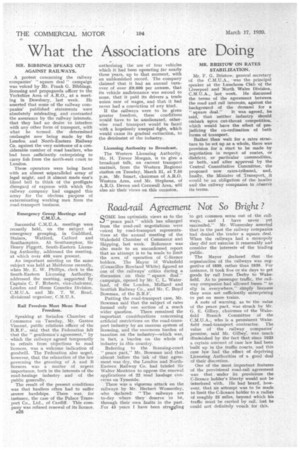What the Associations are Doing
Page 46

If you've noticed an error in this article please click here to report it so we can fix it.
MR. BIBBINGS 'SPEAKS OUT AGAINST RAILWAYS.
A protest concerning the railway companies' 'square deal" campaign was voiced by Mr. Frank G. Bibbings, licensing and propaganda officer to the Yorkshire Area of A.R.O., at a meeting in Dewsbury, last week. He asserted that some of the railway companies' published statements were absolutely misleading, and contrasted the assurance by the railway interests, that they had no desire to interfere with any other form of transport, with what he termed the determined onslaught now being made by the London and North-Eastern Railway Co. against the very existence of a considerable number of road hauliers, who had been sufficiently enterprising to carry fish from the north-east coast to London.
These operators were being faced with an almost unparalleled array of legal might, and it almost made one's blood boil to think of the profligate disregard of expense with which the railway company had engaged this array for the obvious purpose of exterminating working men from the road-transport business.
Emergency Group Meetings and C.M.U.A.
Successful C.M.U.A. meetings were recently held, on the subject of emergency grouping, in Guildford, Staines, Watford, Catford and Southampton. At Southampton, Sir Henry Piggott, South-Eastern Licensing Authority, addressed the meeting, at which over 400 were present. An important meeting on the same subject was held at Maidstone recently, when Mr. E. W. Phillips, clerk to the South-Eastern Licensing Authority, addressed the meeting, supported by Captain C. F. Roberts, vice-chairman, London and Home Counties Division, C.M.U.A. and Mr. T. W. Read, divisional organizer, C.M.U.A.
Rail Freedom Must Mean Road Freedom.
Speaking at Swindon Chamber of Commerce on Tuesday, Mr. Gaston Vincent, public relations officer of the B.R.F., said that the Federation felt that the " gentleman's agreement," by which the railways agreed temporarily to refrain from objections to road licences, was a welcome indication of goodwill. The Federation also urged, however, that the relaxation of the law governing the granting of A and B licences was a matter of urgent importance, both in the interests of the road-haulage industry and of the public generally.
The result of the present conditions was that hauliers often had to suffer severe hardships. There was, for instance, the case of the Palace Transport Co., Ltd., of Cardiff. This company was refused renewal of its licence,
B28
authorizing the use of four vehicles which it had been operating for nearly three years, up to that moment, with an unblemished record. The company claimed that it had an annual turnover of over £9,004l per annum, that its vehicle maintenance was second to none, that it paid its drivers a trade union rate of wages, and that it had never had a conviction of any kind.
If the railways were to be given greater freedom, these conditions would have to be ameliorated, otherwise road transport would be faced with a hopelessly unequal fight, which would cause its gradual extinction, to the detriment of the industry.
Licensing Authority to Broadcast.
The Western Licensing Authority, Mr. H. Trevor Morgan, is to give a broadcast talk, on current transport matters, from the Western Regional station on Tuesday,. March 21, at 7.50 p.m. Mr. Smart, chairman of A.R.O. Western Area, and Mr. Stephens, of A.R.O. Devon and Cornwall Area, will also air their views on this occasion. MR. BRISTOW ON RATES STABILIZATION.
Mr. F. G. Bristow, general secretary of the C.M.U.A., was the principal speaker at the Luncheon Club of the Liverpool and North Wales Division, C.M.U.A., last week. He discussed the teems of the agreement between the road and rail interests, against the background of the demand for a
" square deal." It was agreed, he said, that neither industry should embark upon cut-throat competition, which would have the effect of prejudicine the co-ordination of both forms transport.
Rather than wait for a rates structure to be set up as a whole, there was provision for a start to be made by negotiation in respect of routes, or districts, or particular commodities, or both, and after approval by the Central Consultative Committee, the proposed new rates-tribunal, and, finally, the Minister of Transport, it would be an obligation of the haulier and the railway companies to observe its terms.




















































































